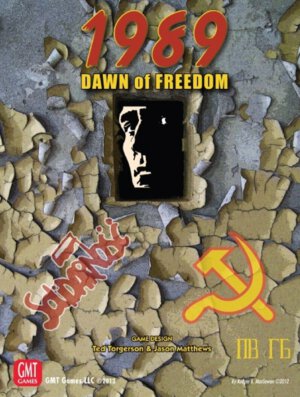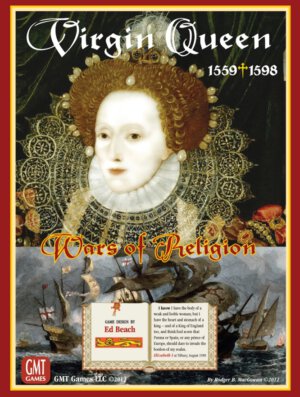Two titles gamers have been anxiously awaiting from our friends at GMT should be arriving on store shelves any day now. 1989: Dawn of Freedom and Virgin Queen are about to hit and if you need anymore incentive to grab a copy of 1989 all you need do is read my review here or listen to more coverage on the podcast. Virgin Queen, on the other hand, is set for review on episode forty-two next week. I’ll give you a hint though… It’s good!
From GMT:

1989 is an exciting, fast paced game simulating the end of the Cold War in 1989. During this amazing year, a series of democratic revolutions ended the 40 year Soviet empire in Eastern Europe. 1989 simulates the political, social and economic aspects of these revolutions using a card driven system similar to Twilight Struggle.
“No man is so old he cannot live one more year.” – Leszek Kolakowski
One player plays the Communist. At the start of the game he holds unquestioned power across the six nations of the Warsaw Pact. But there are omnious clouds on the horizon. The new leader in Moscow has declared no more will Soviet tanks prop up tottering Communist governments. The economies, after decades of central planning and stagnation, have reached various stages of crisis. Inside the churches and among the students and their professors there are dissident movements that have been emboldened. From crushing dissent to offering concessions, the Communist player will have to use a variety of strategies in a struggle to hold on to his empire.
“A bad regime is never in so great danger as when it tries to improve.” – Alexis de Tocqueville
The other player plays the Democrat. At the dawn of 1989, behind the iron curtain, no one considers revolution possible. The goal of dissidents is to create a civil society outside the control of the Communist regimes. On their side are students who are fascinated with the style and pop culture of the west, and the Church. Against them is the vast apparatus of the Communist state. Their challenge is to persuade the workers, who are the bulk of society, to join their cause.
“Mr. Gorbachev, open this gate. Mr. Gorbachev, tear down this wall!” – Ronald Reagan

Virgin Queen is the sequel to Here I Stand, another card-driven game of grand strategy that covered the previous forty years (from Martin Luther’s posting of his 95 Theses in 1517 through the abdication of Charles V in 1556). Players familiar with Here I Stand will find much that is familiar in Virgin Queen: over half of the rulebook remains unchanged. New game systems have been put in place to emphasize the changing nature of the conflicts here in the late 16th Century:
- Religion: Streamlined from Here I Stand, the new rules for religious conversion and rebellion allow actions to be resolved quickly, reflecting the already entrenched presence of both Catholic and Protestant factions across the key areas of religious struggle.
- World Map: Oceanic expeditions are now under direct player control as they sail to the Caribbean and beyond to seize plunder, found colonies, and attempt to circumnavigate the globe.
- Diplomatic Influence: Alliances with minor powers (and major powers that can be activated in games with less than 6 players) are now made through a unified system where players buy influence at each of these foreign courts.
- Weddings: Here I Stand’s secret negotiation phase is still present here in Virgin Queen, but with a new twist. Now you will want to arrange marriages for each of the princes and princesses of your family dynasty with a suitable foreign royal. Will even the Virgin Queen succumb to love and take a husband, or will she jilt that suitor at the last minute once again?
- Patronage: Your royal court will be visited by artists, writers, scientists, and architects, who all want you to invest in their endeavors for the glory and advancement of the realm. Will you sponsor Galileo, Cervantes, or Shakespeare or instead spend your treasury on a fruitless quest for the Philosopher’s Stone?
- Espionage: Beware, there is also a dark side to this period — a time of espionage and spymasters. In Virgin Queen you can ask your ambassadors to spy on foreign courts, send out handgun-armed assassins, invest in cryptology, and even recruit Jesuit priests for undercover missions of conversion.
- 2-Player Tutorial: Great for new players just learning the series, this 90-minute game pits the Ottomans against Spain during the time of the Siege of Malta and Battle of Lepanto. Uses a subset of the full rules so you can dive in quickly.
- Campaign Scenario: The full Virgin Queen experience, this 8-hour game can last up to 7 turns and is normally played with from 4 to 6 players. Variant rules allow you to play with just 2 or 3 players if desired.
- Armada Scenario: A quicker game focused on Turns 3 to 6 of the full campaign, this 4 to 5-hour game is ideal for tournament play. Once again supports from 4 to 6 players.


















